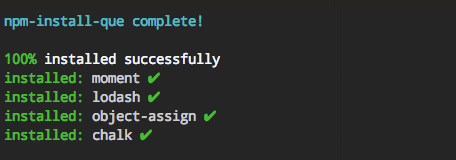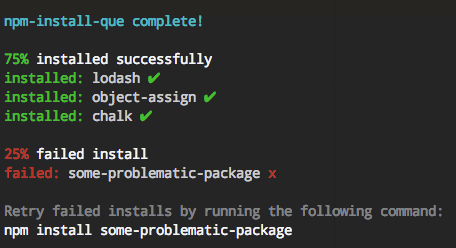Que up your project's dependencies, and automatically install them one-by-one.
Installing dependencies one at a time allows you to keep an eye on things in case something goes wrong. It also puts less
strain on your npm install for large, problematic installations. Sometimes npm hangs during the install, and you have to retry the
entire install all over again. 😕 To deal with this, I wrote this cli tool that attempts to install your dependencies one
at a time, and keeps track of the modules that failed. Doing this means that if you have to attempt a re-install, you only
have to re-install the modules that failed.
This started off as a quick experiment to see if it could help ease the pain of common npm hangs, so pull requests are welcome if you want to contribute.
$ npm install --global npm-install-que
Instead of npm install to install your project dependencies, simply use:
$ npm-install-que
npm-install-que will run just like npm install, giving you all the same npm output you are used to. The main difference,
of course, is that each of your project's dependencies are installed one at a time, and at the end of the install process, you will get a status report.
Please note that npm-install-que does not accept any parameters or arguments, so it's not a full replacement for the npm install
command. If you pass arguments to the npm install command, then you already have the ability to install dependencies one-at-a-time, so there is no need for this module
to support command line arguments.
On Successful Installation: You will see that each module installed without a problem:
On Failed Installations: You will get a list of modules that failed, and a useful retry command to help you attempt a re-install:
If multiple modules fail to install, then npm-install-que will && together the npm install commands to let you retry
them one at a time. For example, if two packages failed, the retry command that will print at the end of the summary
will look something like:
npm install package-name && npm install other-package-name
MIT © Michael Wuergler

